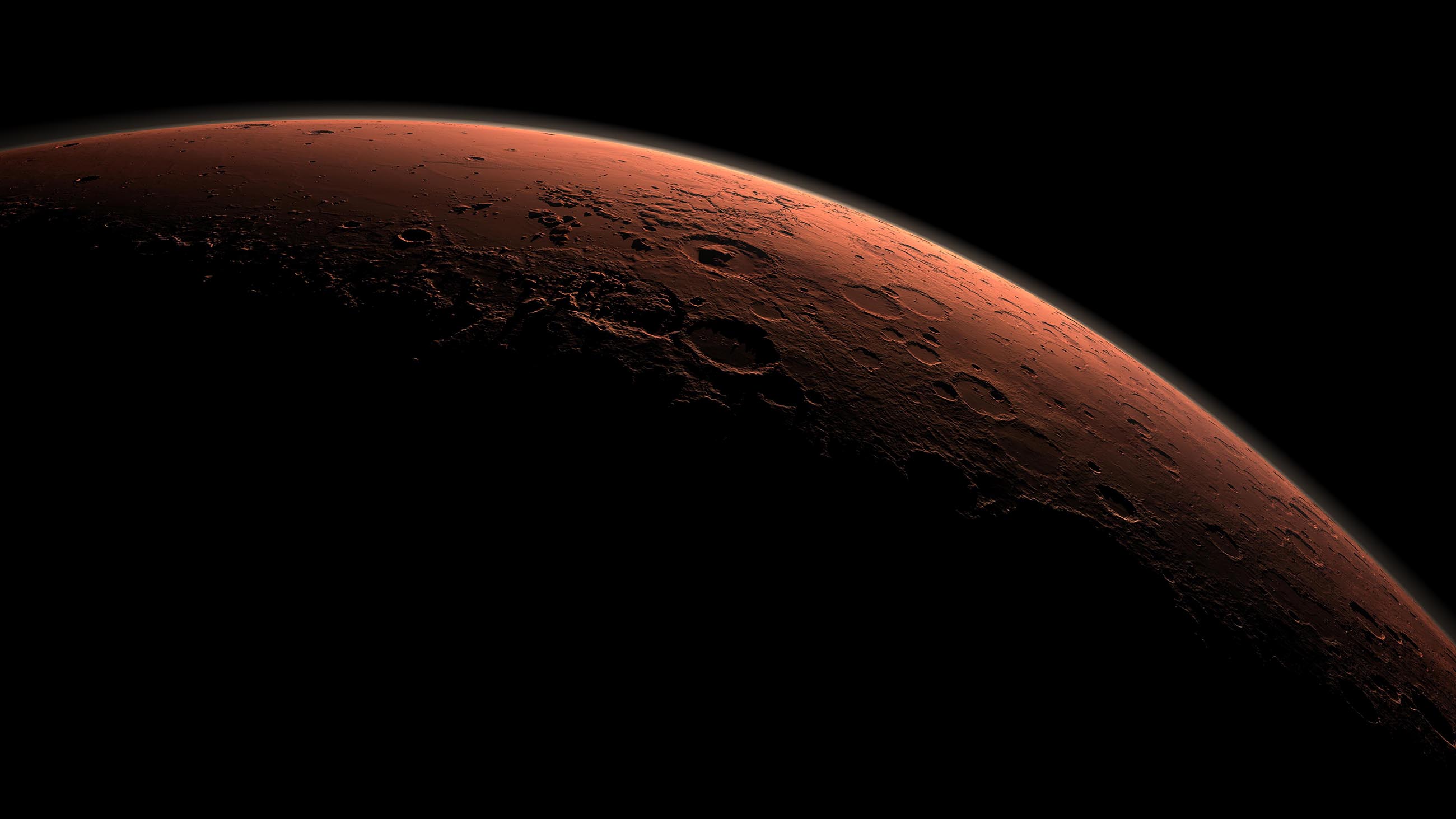Five Questions for Artemis Westenberg
Artemis Westenberg took an unlikely path to the presidency of Explore Mars, the nonprofit advocacy group that insists humans can be on the red planet by 2033.

“I’m not worried about morale. I think that the scientists who go to Mars aren’t going to want to come back for several years.”
Visual: courtesy of Artemis Westenberg
A prominent feminist in the Netherlands, she had a long career in lobbying and public affairs — then became captivated by the idea that women and men could have an equal role in Mars exploration. In the late 1990s, she helped two Dutch advocates get Explore Mars off the ground in their home country, and saw it grow into a worldwide organization whose board of advisers includes the astronaut Buzz Aldrin and the planetary scientist Chris McKay.
Between the elimination of the U.S. Space Shuttle Program in 2011 and repeated cuts to portions of the NASA budget, human exploration of Mars may seem to be receding into the future, not getting closer. But Westenberg argues that Explore Mars’ 2033 deadline is “tough but doable.” For this installment of the Undark Five, I spoke with her at her home near Rotterdam. The conversation has been lightly edited for length and clarity.
UNDARK — With all the other challenges that humanity is facing, why should we devote resources to sending people to Mars?
ARTEMIS WESTENBERG — A civilization that is stagnant, that doesn’t expand, will implode. Human beings have always wanted to explore. You see this in everything from human expansion out of Africa to Europeans leaving their shores to explore so-called new worlds. Of course, other humans already beat them to the shores, but they didn’t know this. Humans have gone to the coldest parts and the hottest parts of the planet, to the highest points and are aiming for the lowest points. And now we will go even further.
Once we get to Mars, and even in getting to Mars, every aspect of the mission is of critical importance. The resources won’t exist to bring along extra people for tasks which, on Earth, are considered menial. Mucking out the latrines will have to be done by the same engineer who is repairing the life-support systems. I’m hopeful that in that situation, we can recreate a society which is much less biased and does a better job valuing people for their contribution rather than by some other arbitrary standard like gender or race.
UD — What are the biggest challenges facing humans who want to travel to Mars?
AW — Other than funding? We’ve landed probes on Mars. You need a bigger vehicle with more stuff, more fuel, with food to get humans there, but those problems are surmountable. We need rockets which can carry more fuel and improvements in life-support systems, but we’ve made tremendous improvements since we first landed on the moon. It’s technologically possible.
People often think of problems with bone density when they think of astronauts in space. But those are problems that are currently being researched. There are other physical problems for astronauts, though. Eye pressure is one. The lack of gravity creates serious issues with the eyes of some astronauts on the International Space Station. And humans going to Mars will be probably be in space much longer.
As for other issues, I’m not worried about morale. I think that the scientists who go to Mars aren’t going to want to come back for several years. I think we’re going to have to convince them they want to come back after six months or a year instead of staying for two or five years.
UD —Why is it necessary to send humans to Mars? Wouldn’t it be more feasible to send robots?
AW — Robots are basically giant dead calculators. They are certainly useful — they’ve done a lot of wonderful work with research on Mars and in other space exploration. I fully expect that robots will accompany humans to Mars. But there are so many things a robot cannot do. What a trained geologist can do in an hour, it will take a robot 1,000 hours. And that’s just the limitations of analysis. Robots can’t pick up a rock and turn it over, which is the first thing a geologist does when examining an area. Robotics technology is improving, but it’s outpaced by the improvements in rockets and life-support systems that would support a human journey.
UD — What can humans learn from Mars?
AW — Mars and Earth are sister planets. They are very similar in everything, from their volcanoes to their polar ice caps. The planets, of course, sport significant differences, like the temperature and the time of rotation around the Sun, but it’s the closest we have to a look at the past of our own Earth and possibly its future.
Like Earth, Mars has frozen polar ice caps and impact craters from major collisions over its history. It also tilts in a similar direction. Recent evidence shows that Mars used to be wetter and warmer, which would make it more likely to support life. It also appears that Mars may have once had a magnetic field similar to Earth. The surface of the Earth has changed dramatically since its formation, due in no small part to plate tectonics. Mars doesn’t have this shifting surface structure anymore, if it ever did.
Humans are already looking to Mars to study everything from climate change to evolution. If we can better understand how Mars works as a planet, we might be better able to understand how Earth works.
UD — How is Explore Mars supporting a human mission to Mars?
AW — There’s two things that we need to get to Mars: money and knowledge. So Explore Mars is focusing on both. When the Trump administration first came into office, they asked us if we could get to Mars by the end of the president’s first term. That’s not technologically possible. But it shows the desire of this U.S. president to go.
We also commissioned a poll a few years ago to show members of Congress that their constituents were interested in going to Mars. Before the survey, I would go to Capitol Hill and some congressperson would say, “This all sounds very interesting, but my constituents aren’t interested in paying to go to Mars.” And that’s simply not true. Our research shows that 75 percent of the U.S. population would increase NASA’s budget to fund a mission to Mars.
We also organize a Mars conference which brings together experts from various fields, not just space, but also engineering, medicine, geology, all of the fields you will need to have a successful mission. Getting them all together, in one place, focused on the goal has brought about a lot of ideas and discoveries.
Molly Quell is an American writer based in the Netherlands, where she works as a science writer for TU Delft.











Comments are automatically closed one year after article publication. Archived comments are below.
Hopefully space will become the ultimate wild west v2.0 where colonists can be free from the growing socialist government interference and constraints here on Earth.
Since I joined the space community in 1983 (I’m currently a consultant to NASA’s astrobiology program and Planetary Defense Coordination Office), I’ve been watching various iterations of “the Moon-Mars thing” come and go. It’ll cost too much, and the rationale for pursuing these goals is not compelling enough to justify the cost.
Meanwhile, in an article titled “Billionaires May Be the Future of Space Policy. Here’s What They Want: Space nations, UFOs, and Mars colonies are on the wish list,” Foreign Policy staff writer Emily Tamkin reports, “a number of private individuals of great wealth are charting the future of space policy, whether through money or influence….” She cites billionaires Igor Ashurbeyli (net worth unknown) and his wacky idea to create a “space nation” called Asgardia, Elon Musk (net worth $20+ billion) and his disturbing focus on colonizing Mars, Yuri Milner ($3.5 billion) and his fringe-y Breakthrough Starshot and Breakthrough Listen initiatives.
And there are more. For example, there’s Jeff Bezos (net worth $98 billion, give or take) – the richest man in the world, depending on what day it is (his net worth depends on the price of stock in Amazon). The Scotland Herald, in an August report on “The world’s weirdest billionaires,” quoted Bezos as saying, “People will visit Mars, they will settle Mars, and we should because it’s cool.”
(Because it’s cool? Oy vey….)
Westenberg and her ilk, who advocate for human colonization of Mars, seems to ignore humanity’s dismal history of colonization on Earth. Why should we expect humans to behave any differently on Mars? The idea of space colonization is driven by neoliberal ideology, which argues for “free” enterprise, private property rights, minimal to no government… Look at the “mission” and “vision” statements of space colonization advocacy groups such as the Mars Society, the National Space Society, and the Space Frontier Foundation.
And then there’s international law. The U.S. is signatory to the 1967 Outer Space Treaty (which, as a ratified treaty is the law of the land), which requires signatories to ensure that they do not contaminate extraterrestrial environments with terrestrial biology, or vice versa when we start bringing back samples from, for example, Mars. Once humans land on Mars, scientific exploration of the planet for evidence of past or present microbial life on Mars effectively comes to an end.
See my blog post: https://doctorlinda.wordpress.com/2016/11/09/journey-to-mars-for-the-science/
Reading your comment I see no reason why we should not colonize Mars.
More specifically I don’t see why people getting money should not use it as they wish.
Anyway, don’t worry, whatever may be your objection and whatever the objections of people in charge of planetary protection, we will go to Mars just because we want to.
Your absurd extremist protection rules will be changed when needed for something more reasonable. The probability of active Martian life on the surface of the planet is extremely low and the probability of such life being harmful to Earth life, is even lower.
Women are going to be the last to realize that Elon Musk is desperate to let the world know that the only thing dumber then traveling 450,000 miles to the moon in a Nazi rocket is launching a sports car at Mars. Have you ever read a quote from the super genius Elon Musk? He drops the f-bomb and says post card garbage. Anyone remember Tesla? The man that gave us our best inventions and shaped the modern world? He always said earth was not a planet, it’s a realm. We use his tech everyday all day but when it came his biggest truth we ignore it. Read one of his quotes, Albert Einstein was asked “What it is like being the smartest person in the world?” He replied “I don’t know, ask Tesla.” You can’t go to space without Einsteins E=MC squared, theory to explain a theory. We humans were powerful enough to realize our world 5o years after we first left the ground?
What, sorry?